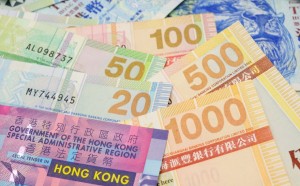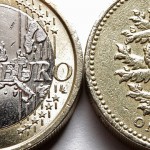 Friday’s trade saw EUR/HKD within the range of 9.8004-9.8487. The pair closed at 9.8288, gaining 0.19% on a daily basis, while losing 0.73% for the whole week.
Friday’s trade saw EUR/HKD within the range of 9.8004-9.8487. The pair closed at 9.8288, gaining 0.19% on a daily basis, while losing 0.73% for the whole week.
Fundamentals
Euro zone
German business conditions
Business climate in Germany probably worsened in October, with the respective gauge slipping to 104.1 from 104.7 in September. If so, this would be the lowest index reading since December 2012, when it stood at 102.4.
The IFO Business Climate Index reflects entrepreneurs’ sentiment in regard to current business situation and their expectations for the next six months. The index is based on a survey, conducted by phone and encompasses 7 000 companies, that operate in sectors such as manufacturing, construction, wholesaling and retailing industry. The Business Climate Balance represents the difference between the percentage share of respondents that are optimistic and the share of respondents that are pessimistic. The balance can fluctuate between -100, which suggests all responding companies assess their situation as poor and expect business conditions to deteriorate, and +100, which suggests all responding companies assess their situation as good and expect an improvement in business conditions. In order to calculate the IFO Business Climate Index, the Balance is normalized to the average of a base year, which currently is 2005.
The IFO Business Climate Index is comprised by two equally-weighted sub-indexes – a gauge of expectations and a gauge of current assessment. The IFO expectations index probably dropped to 98.4 in October from 99.3 in September, as the latter has been the lowest since December 2012. The IFO current assessment index probably slid to 109.5 in the current month from 110.5 in September. If so, this would be the lowest index level since June 2013. In case any of the gauges registered a larger than projected decline, this might have a bearish effect on the common currency.
The CESifo Group is to release the official numbers at 9:00 GMT on Monday.
Stress tests
At 12:00 PM Frankfurt time on Sunday (October 26th), the financial world will learn which of the 130 largest banks in the Euro zone failed the European Central Bank’s year-long examination of lenders asset strength and ability to cope with economic turbulence. ”There will be enough for policy makers to declare victory, but the full picture will take longer to emerge because this thing is so complicated”, said Nicolas Veron, a fellow at the Bruegel research group in Brussels, as reported by Bloomberg News. ”What you don’t want is to sound the all clear and then three to six months later, there’s an unpleasant surprise.”
Some of the banks may have already failed. That may be the case with the smallest state-owned bank in Ireland, Permanent TSB Group Holdings Plc. It failed in the ECB’s adverse stress test, which assesses banks resilience over three years, following a hypothetical recession and a collapse of bond markets.
The two prior stress tests, conducted by the European Banking Authority, did not indicate problems at banks, which failed at a later time.
Hong Kong
The deficit on Hong Kongs Balance of Trade probably widened to 39.2 billion HKD during September, according to the median forecast by experts, from a deficit of 31.53 billion HKD, registered in August. Total exports of goods (comprising re-exports and domestic exports) rose at an annualized rate of 6.4% to HKD 327.2 billion in August, following a year-on-year increase of 6.8% in July. The value of re-exports rose 6.4% to reach HKD 321.9 billion in August and the value of domestic exports surged 7.2% to HKD 5.3 billion. At the same time, total imports of goods rose at an annualized rate of 3.4% to HKD 358.8 billion in August, following a year-on-year increase of 7.5% in the prior month, according to data by the Census and Statistics Department.
The trade balance, as an indicator, measures the difference in value between country’s exported and imported goods during the reported period. It reflects the net export of goods, or one of the components to form country’s Gross Domestic Product. Generally, exports reflect economic growth, while imports indicate domestic demand.
Hong Kong has been producing deficits on its trade balance since late 1990s, as imports rose at a faster rate than exports. The country exports primarily electronics and household electrical appliances, clothing and footwear, textile yarn and fabrics, while its imports include machinery and equipment, manufactured goods, mineral fuels and food.
In case the trade balance deficit widened more than anticipated, this would have a bearish effect on the local dollar. Hong Kongs Census and Statistics Department will release the official trade data at 8:30 GMT.
Pivot Points
According to Binary Tribune’s daily analysis, the central pivot point for the pair is at 9.8260. In case EUR/HKD manages to breach the first resistance level at 9.8515, it will probably continue up to test 9.8743. In case the second key resistance is broken, the pair will probably attempt to advance to 9.8998.
If EUR/HKD manages to breach the first key support at 9.8032, it will probably continue to slide and test 9.7777. With this second key support broken, the movement to the downside will probably continue to 9.7549.
The mid-Pivot levels for Monday are as follows: M1 – 9.7663, M2 – 9.7905, M3 – 9.8146, M4 – 9.8388, M5 – 9.8629, M6 – 9.8871.
In weekly terms, the central pivot point is at 9.8573. The three key resistance levels are as follows: R1 – 9.9317, R2 – 10.0346, R3 – 10.1090. The three key support levels are: S1 – 9.7544, S2 – 9.6800, S3 – 9.5771.





